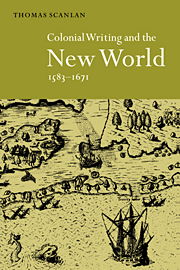Book contents
- Frontmatter
- Contents
- List of illustrations
- Acknowledgments
- Introduction
- 1 The allegorical structure of colonial desire
- 2 Fear and love: two versions of Protestant ambivalence
- 3 Forgoing the nation: the Irish problem
- 4 Preaching the nation: the sermon as promotion
- 5 Love and shame: Roger Williams and A Key into the Language of America
- 6 Fear and self-loathing: John Eliot's Indian Dialogues
- Coda
- Notes
- Index
Introduction
Published online by Cambridge University Press: 04 December 2009
- Frontmatter
- Contents
- List of illustrations
- Acknowledgments
- Introduction
- 1 The allegorical structure of colonial desire
- 2 Fear and love: two versions of Protestant ambivalence
- 3 Forgoing the nation: the Irish problem
- 4 Preaching the nation: the sermon as promotion
- 5 Love and shame: Roger Williams and A Key into the Language of America
- 6 Fear and self-loathing: John Eliot's Indian Dialogues
- Coda
- Notes
- Index
Summary
Fifteen-hundred-and-eighty-three might strike some readers as an odd date to use as the starting-point for a study of English colonial writing. Its significance lies not in its marking a decisive act, such as the embarkation of a voyage, the founding of a colony, a hardfought battle with intransigent natives. Rather, 1583 marks the date of publication of an extremely influential and significant colonial text. I am referring to the translation into English and the publication in London of Bartolomé de Las Casas's Brevíssima relación de la destrucción de las Indias. That text, which Tom Conley and others have suggested marks the genesis of the so called “Black Legend,” could also be said to mark the beginnings of the English attempts to fashion a national identity through colonial endeavor.
If nothing else, the first English translation of Brevíssima relación demonstrates the extent to which England's colonial project was born, at least in part, out of a conscious desire to compete with its Catholic rivals (especially Spain) for power and prestige on the world stage. In spite of the complex European geopolitical context in which English colonialism was conceived, however, most scholars of Anglo-American colonial history have, until recently, treated the colonial phenomenon either as an exclusively American phenomenon or, conversely, as a European one. Accordingly, the study of the colonial period has remained surprisingly insular, as scholars from two distinct fields have consistently failed to engage in a dialogue. Scholars working in the field of American Studies have attempted to account for the origins of what has come to be known as the American self.
- Type
- Chapter
- Information
- Colonial Writing and the New World, 1583–1671Allegories of Desire, pp. 1 - 7Publisher: Cambridge University PressPrint publication year: 1999



